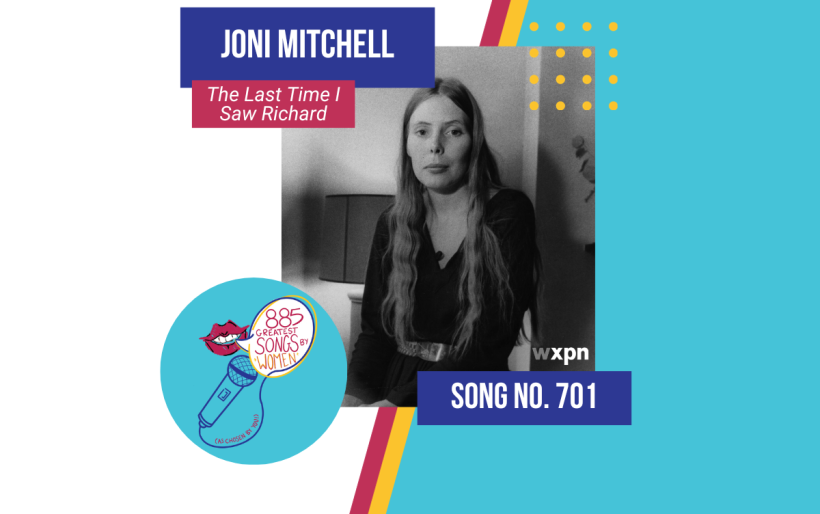Throughout the 885 Greatest Songs By Women (As Chosen By You!) countdown, we’ll take you on deeper dives into select songs that pop up each day.
An incredibly introspective song full of heartache and disillusionment, “The Last Time I Saw Richard” by Joni Mitchell takes you to a scene of two old friends or lovers. Its minute-long piano intro foreshadows every nuance in the song before we are presented with a snapshot of two lives, their changes, their choices, and the bittersweet wisdom of it all. It’s the closing song on Mitchell’s iconic 1971 album Blue — an intimate, introspective masterpiece that found the songwriter turning away from the hope and optimism of the 60s hippie era and into personal reflections on heartache, growth, change, and world-weary cynicism. The song’s narrative, compressed into four minutes, provides us a picture of a dimly lit cafe in Detroit back in 1968, where two people reunite after a period of separation, trying to bridge the gap between each other.
Mitchell’s melismatic vocals recite the poem of these distinct characters. The cynic Richard is a realist and believes that all romantics eventually become “cynical, drunk, and boring.” His cautionary, guarded perspective on life and love juxtaposes what Mitchell sings about in her first-person narration, painting a picture of a person who’s drawn to the conventional symbols of love: roses, kisses, and pretty lies. Richard’s outlook reflects the scars of life’s disappointments and his jaded experiences. Joni, with her enduring idealism and depth of emotion, responds in her unique way. She challenges Richard, suggesting he might be projecting his pain onto her. She refuses to accept that she’s destined to become just like him, and this exchange encapsulates the heart of the song. It’s a conversation that could resonate with anyone who has revisited a past relationship or friendship and found that you and the other person have changed.
Mitchell’s lyrics are rich with metaphors and vivid imagery. She describes her eyes as “full of moon” and contrasts them with Richard’s eyes, which she sees as “tombs.” These poetic elements add layers of complexity to the emotional landscape of the song, capturing the essence of their experiences.
In the final verse, we learn that Richard has settled into a conventional life marked by marriage and purchasing household appliances. In contrast, Joni embraces the cafe’s darkness and solitude and blows out the candle to invite darkness. She suggests that this phase of darkness is temporary and will ultimately lead to her transformation and growth, paralleled in the line, “I get my gorgeous wings and fly away.”
“The Last Time I Saw Richard” is a song that transcends generations and resonates with listeners of all ages. It’s a testament to the maturity of Joni Mitchell’s songwriting and makes you think deeply about yourself and the world around you. Helping listeners understand the importance of personal evolution reminds us that personal growth is more effortless for optimists. While we all continue to grow and change, we can find solace and connection through the shared wisdom of songwriters like Joni Mitchell.
